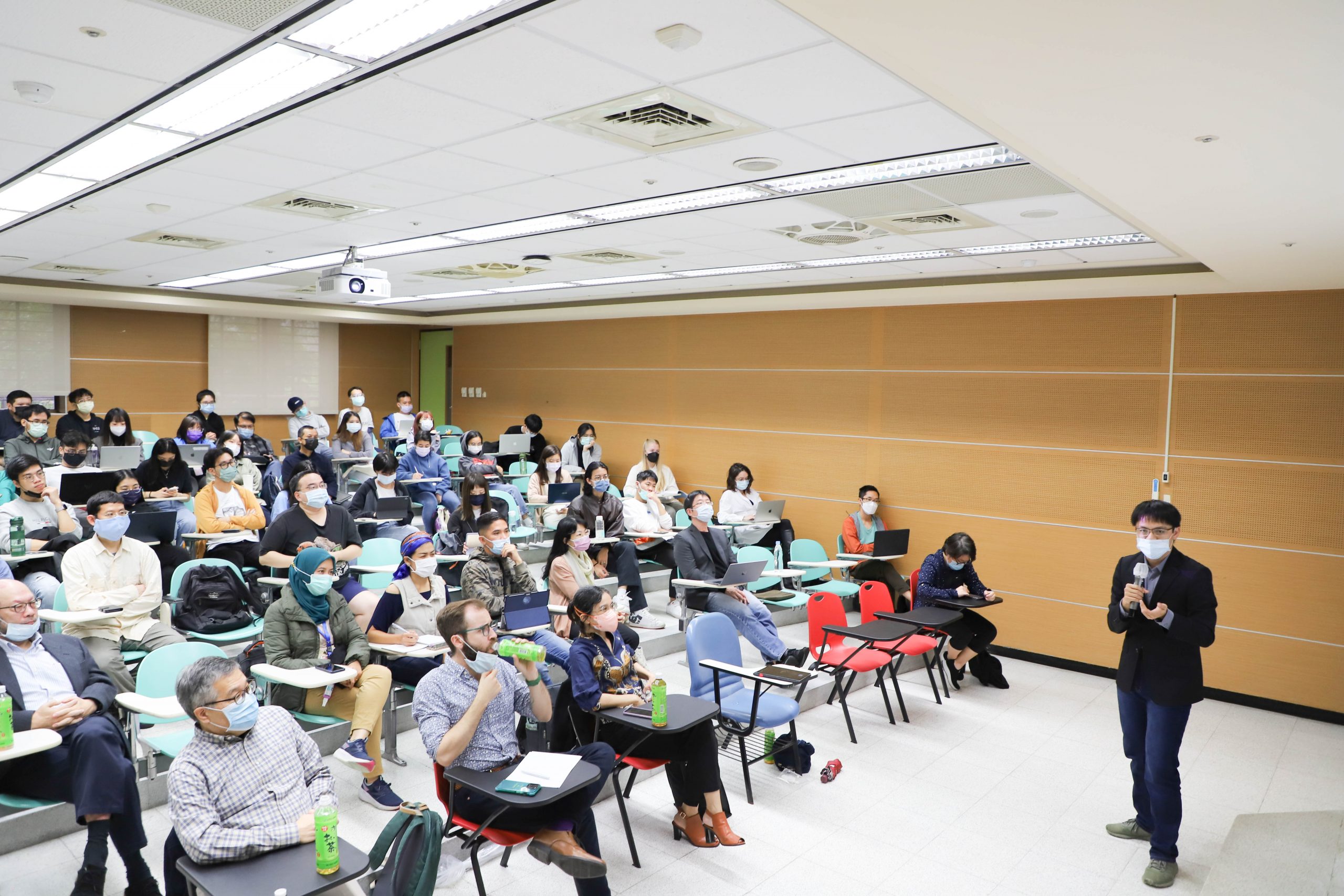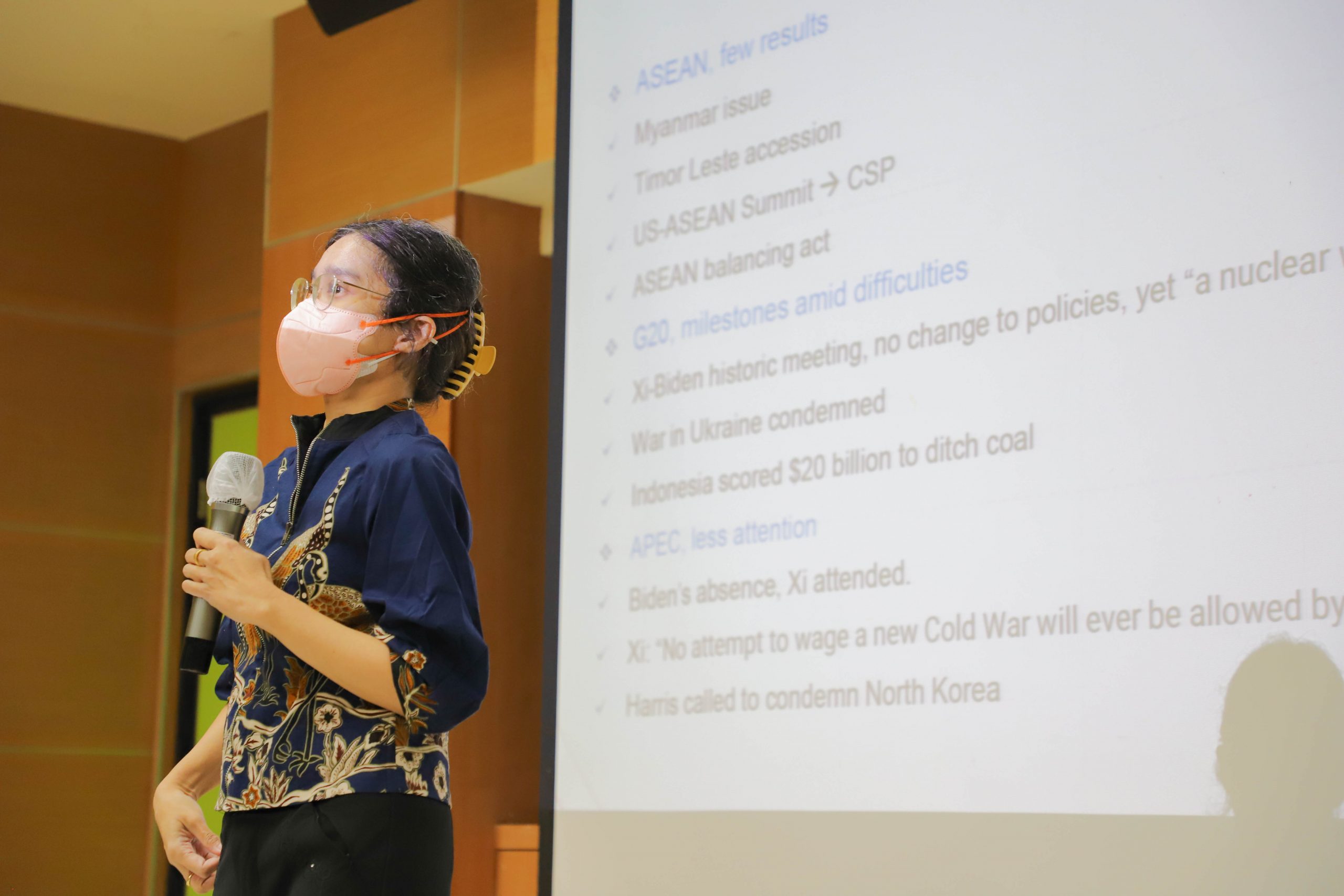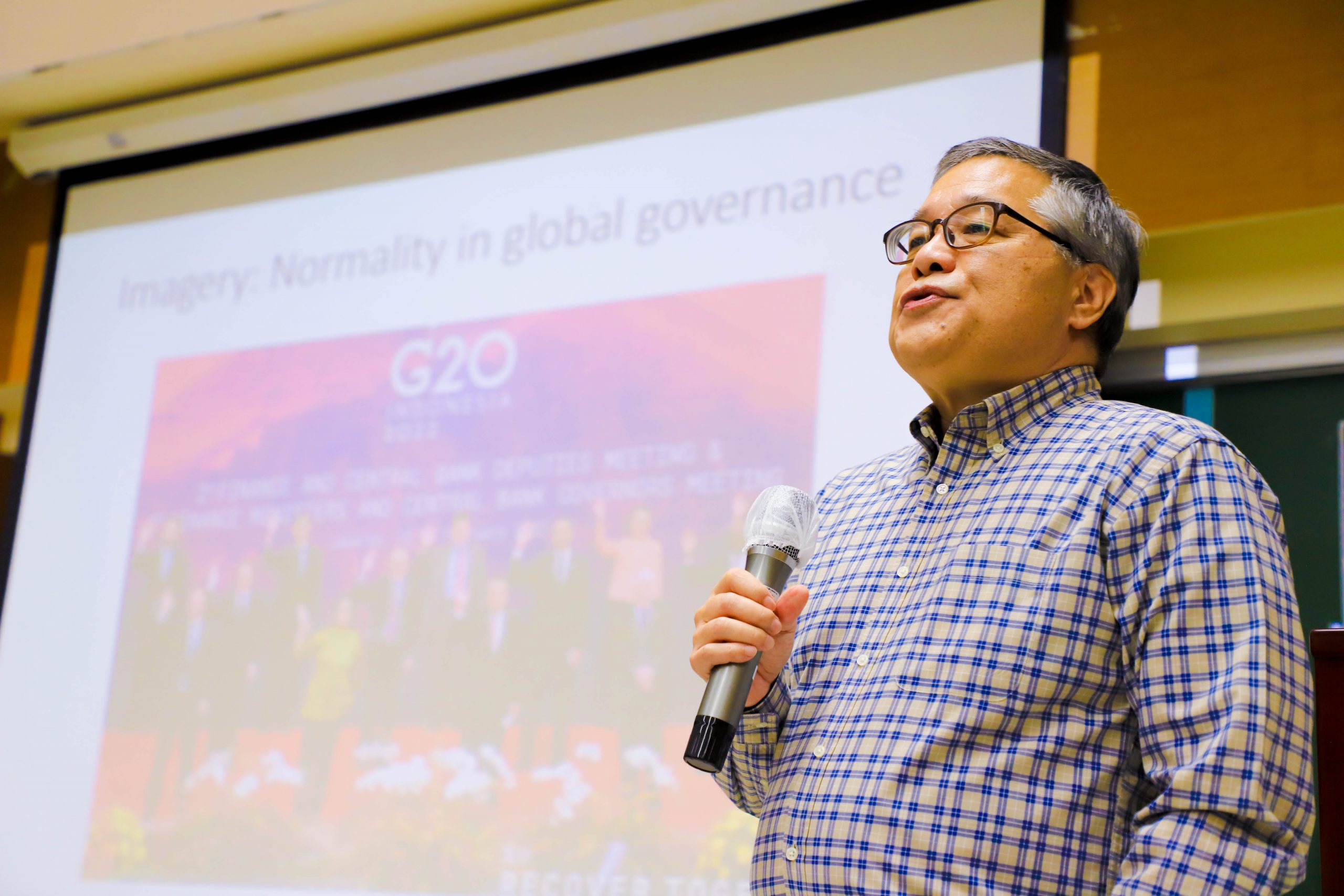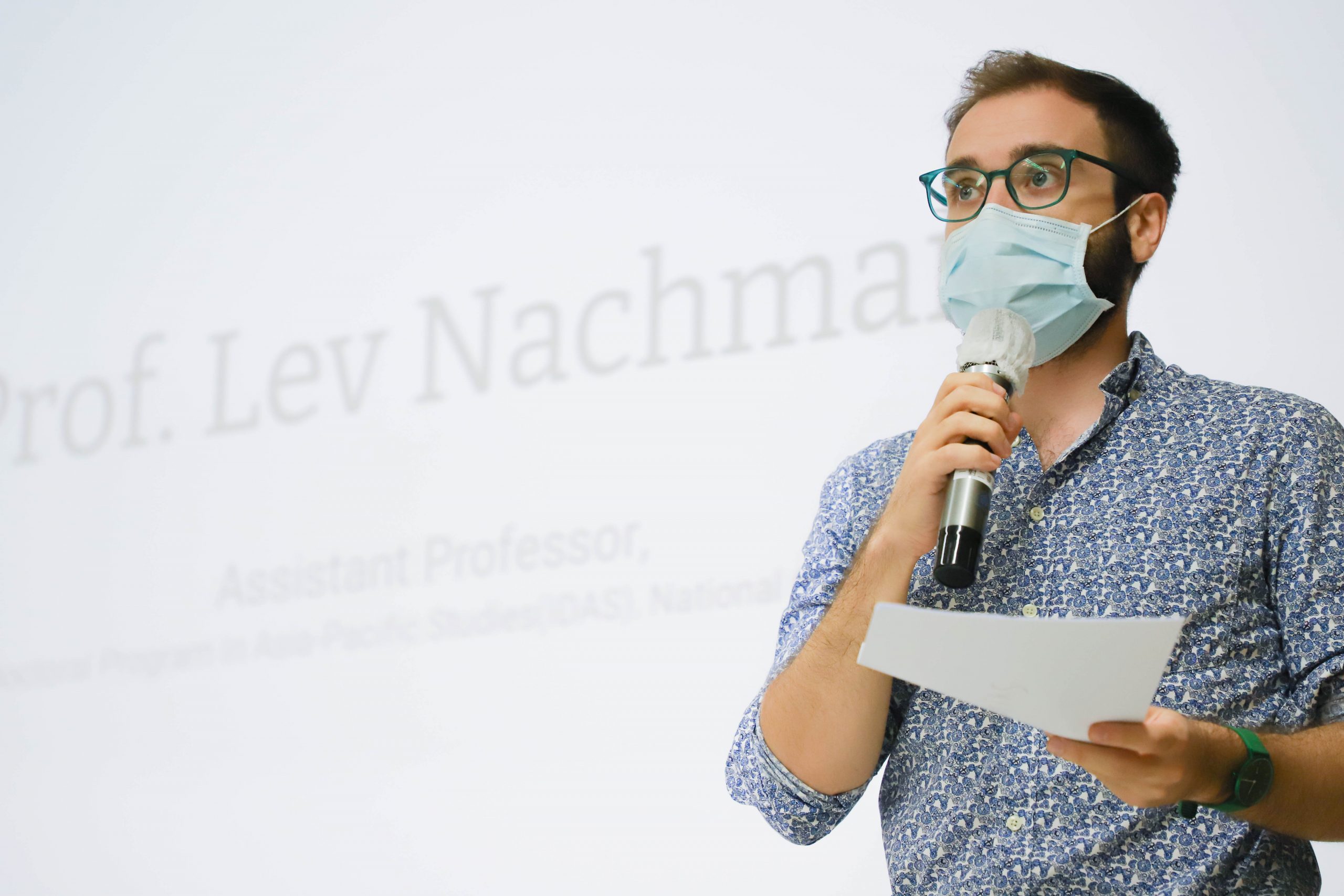



On December 7th, 2022, the International College of Innovation (ICI) at National Chengchi University (NCCU) commenced a flash course regarding the state of world politics after three major international summits—namely, the Association of Southeast Asian Nations (ASEAN) Summit, which was held in Cambodia. Followed by the Asia-Pacific Economic Cooperation Summit (APEC)—held in Thailand. And last but not least, the Group of Twenty (G20) Summit—held in Bali, Indonesia. The flash course was commenced in the General Building of National Chengchi University during lunchtime—despite being set during lunchtime, the venue became packed with an enthused audience just minutes after the bell hits noon.
Invited speakers of the flash course will each be speaking from 3 points of view regarding the summits—namely, from the point of view of Northeast Asia, Southeast Asia, and Taiwan. Professor David M. Arase, who spoke from the point of view of Northeast Asia, is a current Resident Professor of International Politics at Hopkins Nanjing Center of the John Hopkins University’s School of Advanced International Studies. Following that, Professor Deasy Simandjuntak, who is currently an Assistant Professor at the International College of Innovation at National Chengchi University, spoke from the point of view of Southeast Asia. And speaking from the point of view of Taiwan is Professor Fang-Yu Chen, who is currently an Assistant Professor of Political Science at Soochow University, Taiwan.
The flash course kicked off with a brief introduction from Professor Ping-Yin Kuan, who is currently an Adjunct-Distinguished Professor at the International College of Innovation at National Chengchi University. Following that, moderator Professor Lev Nachman, who is an Assistant Professor in the International Doctoral Program in Asia-Pacific (IDAS) at National Chengchi University, explained briefly to the audience how the flash course will progress—each speaker was only given 10 minutes each to speak on their topic and afterward there will be a Q&A where the audience was given the chance to ask questions to the invited speakers.
Professor David Arase came first with his presentation on the Northeast Asian point of view of the three summits. He began with the imagery the global institutions are trying to project to the world right now—as he spoke, the projector showed an image of the world leaders smiling at the G20 Summit. Professor Arase then compared it to what’s happening in the world—at this point, the projector showed images of the ongoing Russo-Ukraine War, North Korea’s continued military forces, and the brief altercation between Prime Minister Justin Trudeau of Canada and President Xi Jinping of China during one of the G20 meetings. Following that, Professor Arase also compared statistics of the general opinions of the Japanese and Chinese concerning which country is the perpetrator of increased tensions in the global sphere, whether there will be military conflict in the Taiwan Strait, and so on. He ended his presentation by showing a picture of the Korean soldiers with the Japanese soldiers training together in the United States—or making up, as Professor Arase has mentioned.
“The situation is changing very rapidly; I don’t think people are aware of it.” Professor Arase said as he concluded his part.
Following Professor Arase’s speech, Professor Deasy Simandjuntak stepped in to address the three summits from the Southeast Asian perspective. She emphasized that the three summits occurred in the Southeast Asian region.
“If there is an open skirmish, Southeast Asia will be the battleground.” quoted Professor Simandjuntak.
She also pointed out how Taiwan is becoming a point of contention in the rivalry between the great powers of the world. Professor Simandjuntak added that with the new Southbound policy enacted, there are hopes from the Taiwanese academia to understand the Southeast Asian region better and to foster a deeper relationship. Regarding the ASEAN Summit, Professor Simandjuntak mentioned Myanmar’s absence due to their lack of invitations—which has been occurring since last year. With Indonesia becoming the ASEAN chairman in 2023—Indonesia is known for having a tougher stance with the situation in Myanmar and the ongoing violence done by the military junta to its civilians—there are hopes that there will be a favorable solution for the Myanmar people. Professor Simandjuntak also mentioned another milestone that ASEAN reached, which is Timor Leste’s accession to becoming a member of ASEAN—a milestone, as Timor Leste has been applying membership for the past few years.
The third speaker, Professor Fang-Yu Chen proceeded after Professor Simandjuntak’s speech to share his perspective from the Taiwanese point of view. He started with a comment on how world politics will remain the same, mainly with the superpower showdown between China and the United States continuing. A picture of President Joe Biden visiting an opening of a new TSMC (Taiwan Semiconductor Manufacturing Company) factory in Arizona was shown in Professor Chen’s presentation—this diplomatic tie between the US and Taiwan, Professor Chen cited, is part of the plan of the US to bring the global supply chain back to the US and to reduce their dependence on China.
“In this globalization era, the economies of each country are highly interdependent.” Professor Chen cited when talking about the decoupling of countries from China.
Regarding China’s agenda on Taiwan, Professor Chen mentioned that in the long run, it will not change. He concluded that China is still pushing its agenda on unification, whereas in the past it has been more anti-independence of Taiwan.
Next comes the Q&A session, where the audience enthusiastically posed their questions to the speakers. Some audience came in asking regarding the possibility of a 2nd Cold War, gender advocacy, Japan and Korea’s relation, how Taiwan will be affected by the US’s recalibration of the global supply chain, and so on.
“Do you think Taiwan is ready?” an audience asked whether or not Taiwan is ready for a war with China.
Professor Chen answered this question quite realistically; China and Taiwan are asymmetrical—on the defense side, Taiwan is not ready. Afterward, another audience asked whether or not people should be pessimistic about China trying to conquer Taiwan through military forces. This time, Professor Chen responded that there should be no room for pessimism or optimism—it’s Taiwan’s destiny. The question is only when and how Taiwan will fight back.
With that, the event concluded with a photo session. The audience was told to keep an eye out for the next flash course that ICI will organize.





